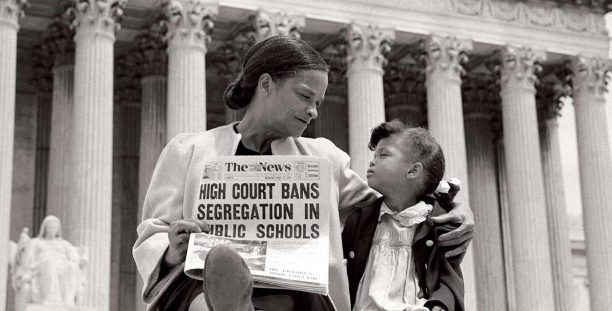NAACP honors Brown v. Board anniversary with multi-day tribute
Published 12:05 am Thursday, May 8, 2025
|
Getting your Trinity Audio player ready...
|
“When day is done, greet the dawn and not the setting sun.” That was the favorite quote of Oliver Hill. Instead of focusing on what’s behind us, we need to look forward, Hill argued. And he fought for that belief, as the attorney taking on the case of Barbara Rose Johns and the other students of the Moton School. He might not have realized it at the time, but Hill’s decision to take that case led to a critical point in U.S. history. What started as Davis v. County School Board of Prince Edward County soon grew.
The case eventually went to federal court and merged with a number of others out of South Carolina, Delaware, Washington D.C. and Topeka, Kansas. Those five cases combined to form Brown v. Board of Education, using the name of Oliver Brown, who was a plaintiff in the Kansas case. And as we mark the 71st anniversary of that ruling, the Prince Edward chapter of the National Association for the Advancement of Colored People (NAACP) plans for the first time to hold a three-day celebration next week, including programs marking the 61st anniversary of the public schools reopening. The goal is also to honor the teachers affected by and displaced as a result of the Prince Edward schools closing.
That celebration will run from May 15 to May 17, culminating in the NAACP’s annual Freedom Fund Banquet on Saturday, May 17.
Marking the Brown v. Board anniversary
May 17 will be the 61st anniversary of the reopening of Prince Edward County Public Schools.
After all, the story doesn’t end with the Brown v. Board of Education ruling. In fact, reactions to that case sparked Civil Rights battles for more than a decade. Yes, we’ve heard of “massive resistance”, the fight by Virginia’s government against integration. But in Farmville and Prince Edward County as a whole, that took on an entirely different look.
Prince Edward County’s Board of Supervisors decided in June 1959 to not appropriate any funding at all for the school system, rather than integrate. That meant all public schools in the county had to close for what eventually became a five-year period.
“We can still see the effects of that today,” NAACP Prince Edward Chapter President James Ghee said. He points to the consequential low number of black students entering teaching and the resulting shortage of role models in the field “(b)ecause they have not been shown what a black educator can do.”
The precursor to the banquet will be two days of discussion about the Brown decision and the impact of desegregation on black educators. The focus on Thursday, May 15 will be on the 71st anniversary of Brown vs Board of Education, which struck down segregation in education. Activities on Friday, May 16, will be on the 66th anniversary of the closing of the public schools.
In Farmville, school closure meant the layoff of all the system’s black teachers, and across the nation desegregation led to the dismissal of many of them as systems kept their white counterparts.
Prince Edward gave tuition grants to students, instead of opening schools, to be used at private schools. But there were no private schools in the region that allowed Black students, so from 1959 to 1963, Black children in Prince Edward County were left out.
It was something an entire community had to deal with. Children were being kept out of the only classrooms available. A 1964 study done by Dr. Robert L. Green of Michigan State found that out of 1,700 Black school age children in the county, an estimated 1,100 had received almost no formal education during the period schools were closed. In the post-pandemic world, we discuss learning loss because students weren’t able to be in class for one semester or a full year for some. More than triple that and you start to have an idea of what was taken away.
The legacy of ‘the fighting preacher’
Things will wrap up next week as mentioned with the Freedom Fund Banquet, held at 3 p.m. on Saturday, May 17. That’ll be at the Fireman’s Arena, located at 1328 Zion Hill Road.
Rev Eric Griffin will be the banquet’s featured speaker. Griffin is pastor of St. Stephen United Church of Christ in Greensboro, NC, and the son of Rev. L. Francis Griffin.
Rev. L. Francis Griffin was a mentor and supporter of Barbara Rose Johns and the other students in that 1951 strike at Moton High. He helped connect them with NAACP attorney Oliver Hill, which led to the legal case being filed.
People called Rev. Griffin the Martin Luther King Jr. of Farmville. He also earned a nickname as “The Fighting Preacher,” both locally and nationally. Griffin was focused on the social gospel during his life, speaking out against injustice whenever he saw it. The Farmville preacher’s words back that up, as he was repeatedly quoted as saying he believed “in the care of people here on Earth and in the hereafter,” following what he found in the teachings of Jesus. And while his own legal case may not be as well-known nationally as Brown v. Board of Education, it was in many ways a followup to that situation.
Francis Griffin had two children at the time, both of whom were not allowed to attend any private schools since they were Black. As we mentioned, public schools in Prince Edward were closed at the time and private schools were just that, able to allow or disallow whoever they wanted. He filed a lawsuit, challenging the supervisors’ decision.
And so, for the second time in a decade, Prince Edward County ended up in court. This time, it also went before the U.S. Supreme Court, in the March 1964 Griffin v. County School Board of Prince Edward County case.
After two months of discussion and debate, the justices ruled Prince Edward’s decision to close all local public schools and provide vouchers for students to attend private school was constitutionally impermissible. That’s because it violated parts of the Equal Protection Clause of the Fourteenth Amendment. Black students didn’t have the same opportunity as others in the district, because none of the private schools would accept them.
Reaching out to take part
Banquet tickets can be purchased through the NAACP, and the organization officials say they’re still looking for financial sponsors to purchase advertising space in the commemorative journal, or a table at the event.






